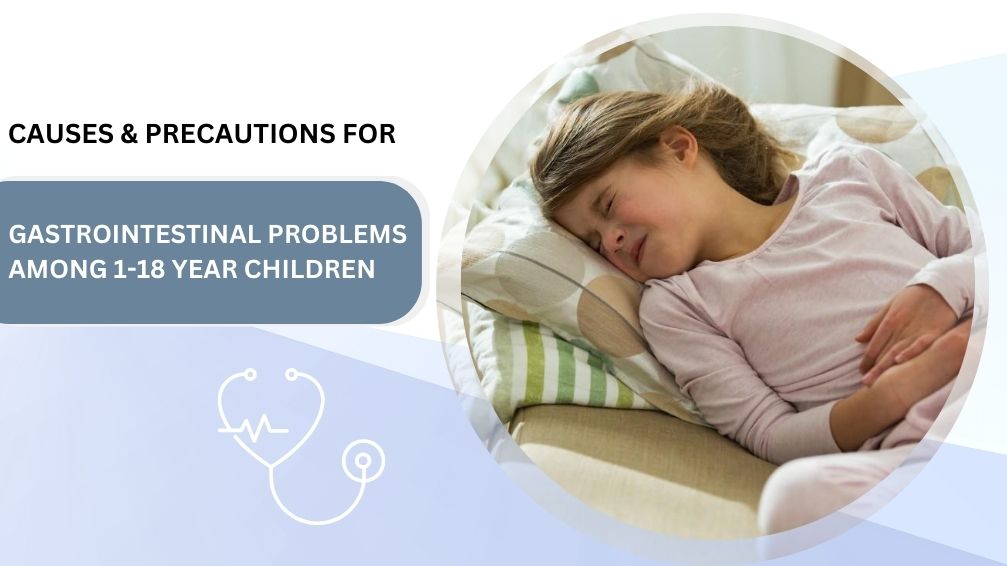-

CAUSES AND PRECAUTIONS FOR GASTROINTESTINAL PROBLEMS AMONG 1-18 YEAR CHILDREN
Gastrointestinal problems are among the most common disorders faced by children around the world. Severe gastrointestinal problems can be especially devastating. They cause dehydration and an imbalance of blood chemicals (electrolytes) resulting from the loss of body fluids in the stool and vomit.
Children who live in countries where care and treatment is often not easy to access; and are vulnerable, suffer the most. Many die due to poor OR improper care and treatment.
When compared to these countries, India fortunately is in a better position in many ways. Make sure if your child has GI problem, get in touch with the best gastroenterologist doctor in Bangalore, Manjunath Haridas.
CAUSES OF GASTROINTESTIONAL PROBLEMS
The causes of gastrointestinal problems in children aged between 1 to 18 years, include:-
ANXIETY AND STRESS
Children these days are under a lot of stress. From school issues to safety concerns, emotional worries, health disorders, and more, children face a number of issues. This is leading to more emotional problems culminating in anxiety and stress.
Emotional turmoil in children like in adults can occur as abdominal pain, diarrhea, appetite loss, bloating, inflammation, cramping, and other gastrointestinal symptoms. Additionally, it can worsen existing gastrointestinal disorders as well.
Social media abuse is another major contributor to anxiety and stress. Today’s children have access to more Smartphone’s, and other electronic gadgets, more than before. Worse still, most of them are on devices almost constantly. They are exposed to mental and physical abuse that can eventually wear them down and make them feel anxious or stressed out.
When children become anxious or feel stressed out, what happens is that the sensory nerves in the gastrointestinal system connected to the sensory nerves in the brain can manifest physically.
VIRUSES
It is among the most common causes of gastrointestinal problems in children.
Some common viruses that affect children include:
- ROTAVIRUS: It is a common virus that causes gastrointestinal problems in children (its common children in the western nations). Most children catch them before they are 5 years old. Once a child has rotavirus, the body usually becomes immune to catching the virus again. Even adults get affected, with most of them catching the virus in their childhood.
- ADENOVIRUS: Like rotavirus, it is common in infants and younger children than in teenagers.
What is concerning is viruses can easily spread from an infected person to another person through close contact. The spread takes place when an infected person touches taps or toilets or surfaces or objects, the virus will stay put there and transmit itself to others who touches them. Similarly, the virus can also be passed on if the infected person prepares food.
In the majority of cases, outbreaks of a virus causing gastrointestinal problems occur in educational institutions, hospitals, hotels and restaurants, and other public places.
FOOD POISONING
Food poisoning happens when the child eats food infected with microbes or viruses, resulting in bacterial infection which in turn causes gastrointestinal problems.
Parasites and Toxins produced by bacteria can also cause food poisoning. While parasites are living things called organisms that live within, or on, another or organism; toxins are atoms or molecules created by microbes that are poisonous and targets cells.
Aside from food poisoning, food allergies or intolerance to certain types of food, also cause gastrointestinal problems in children, with the resultant reaction manifesting as gastrointestinal pain, or diarrhea or vomiting or other such like concerning symptoms.
POOR FIBER DIET
Fiber is crucial to digestive health. It helps children to feel fill and also aids in the digestion of certain foods; and provides wide-ranging health benefits.
Like in adults, it is important for children also to consume a certain amount of fiber every day. Fiber can be found in foods like fruits, legumes, vegetables, and whole grains.
A diet that is low in fiber also helps to reduce bloating in children and ease their digestive issues ranging from abdominal pain to constipation, and even onset of colon cancer later in their lives.
NOT DRINKING SUFFICIENT WATER
Water is important to digestive health. It helps to cleanse the whole of the gastrointestinal tract; and softens the stool thereby helping prevent constipation. Aside from this, it also aids the digestive system by helping break down food, thus assisting the GI tract to absorb nutrients quicker and better.
Children who do not drink enough water become prone to gastrointestinal problems. This can be avoided by not only drinking sufficient amount of water every day but also by drinking unsweetened coffee, or tea. On the whole, getting to those 8 glasses of liquid a day will help a lot.
Children must avoid drinking soda or beverages in excess.
INTAKE OF A LOT OF DIARY FOODS
Milk and cheese are loaded with fats and proteins that are often difficult to digest. Some medical studies have even confirmed that they have a pro-inflammatory effect. This can lead to bloating, constipation, gas issues, and abdominal cramps.
Children suffering from gastrointestinal problems are better advised to take doctor’s advice on how much of dairy products, if allowed, must be consumed in a day.
POOR OR LAZY LIFESTYLE
A certain amount of physical activity in a day is vital for the overall health and digestive system in not only children but also adults. Insufficient amount of physical activity or exercise in a day can have a debilitating effect on the GI tract of children.
A combination of proper exercise and diet (avoid food that cause inflammation) with balanced lifestyle habits, is recommended for children to keep GI problems at bay.
GENETIC FACTORS
Finally, genetic factors play a key role in GI problems in children. According to medical studies, several immune and autoimmune GI problems have a genetic compound. This means children suffering from GI problems may have inherited it from their parents or family ancestors’.
In some cases, modified genes can cause a GI problem; like cystic fibrosis or hereditary pancreatitis.
PREVENTION OF GASTROINTESTIONAL PROBLEMS
Gastrointestinal problems can easily spread from person to person. Therefore, it is important for children to take precautionary steps to reduce the chances of contracting the problem or prevent it altogether.
In the case of infants, parents must be especially careful to wash their hands after changing infant’s nappies, and before preparing, serving, or eating food. To stay safe, parents must
- Use liquid soap in warm running water
- Dry their hands properly after a wash session.
For older children, parents must make sure
- Toilets are regularly cleaned with disinfectant; And likewise the same with flush handle, toilet seat, sink taps, bathroom surfaces, and door handles, at least daily with hot water and detergent. It is important to use disposable cleaning cloths. Where they use potty, they must wear gloves (also ensure their children do the same) to handle it, dispose of the contents into the toilet, and then wash the potty with hot water and detergent, before leaving it to dry.
- Child washes his/her hands after using the toilet. To stay safe, the child must use liquid soap in warm running water; and then properly dry their hands after washing.
- Soiled clothing or bedding is removed. First stools, if any present on them must be removed and deposited into the toilet. Then wash their hands and feet in a separate wash room at a temperature that’s as high as possible.
- Child is not allowed to share towels or any other clothing.
- Child is not allowed to prepare food for others.
Aside from the above, parents must also ensure that their child stays off nursery or school, or college, until at least 48 hours after the last episode of diarrhea or vomiting. They should also ensure that their child does not come into contact with other children, where possible.
If parents have any doubts or issues, they should check with the best Dr. Manjunath Haridas, the best gastroenterologist in Whitefield, Bangalore.
In case, after an examination at the gastroenterologist hospital reveals the cause of gastrointestinal problem is s germ called Cryptosporidium spp, then they should ensure that their child does not swim in a swimming pool for two weeks after the last episode of GI problem.
CAN GI PROBLEM BE PREVENTED?
The answer is it can be provided children adhere to the advice disclosed above; and also advice recommended by the best gastroenterologist in Bangalore.
Also, even if the children are not in contact with someone with GI problem, parents must ensure
- Proper storage, preparation, and cooking of food.
- Maintenance of proper hygiene.
- Children wash their hands and feet after using toilet; before touching food; and after gardening or playing with pets.
All of these will help to prevent GI problems in the children.
CONCLUSION
When GI problems concerns arise, connect with the best gastroenterology doctors in bangalore at the well known gastroenterologist hospital in Bangalore, M H Surgery.
If done, you can stay assured that your child is in the hands of the best gastro doctor in Bangalore and is guaranteed the best possible care and treatment.

Author: DR. MANJUNATH HARIDAS (MD FACS FICS)
Dr. Manjunath Haridas is one of the leading surgeons for Gastrointestinal Sciences in Whitefield, Bangalore. His area of expertise includes Gastrointestinal Surgery - Colon Rectum, Foregut Advanced Laparoscopic Surgery, and Minimally invasive surgery. He is Honored by the American Board of Certification, fellow Of the American College of Surgeons, SAGES membership and more.

